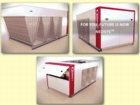Lennox completes range of energy-efficient chillers

The Neosys range of air-cooled chillers from Lennox covers cooling capacities from 200 to 460 kW with very high ESEERs.
With the arrival of the Neosys range of air-cooled chillers, Lennox has completed the Ecolean range and now offers chillers from 20 to 460 kW using R410A. Neosys chillers are available as cooling only units from 200 to 400 kW and heat-pump versions from 200 to 300 kW. The seasonal energy efficiency ratio (ESEER) of Neosys chillers is above 4.0, with an EER of 2.9. Features include the latest generation of variable-frequency drive with Shark aluminium blades and ceramic bearings, adjustable sound-level performance, optional integrated hydraulic module, and aluminium coils with micro-channels. This type of aluminium coil was first introduced in the motor industry, where it has proved to be extremely reliable. The brazed aluminium construction is said to have many advantages compared with the traditional system of copper tubes with aluminium fins. For a particular performance, condensing units are smaller and use 30 to 40% less refrigerant. The risk of corrosion due to using two different metals is eliminated, and this type of coil can be used in light corrosive and some coastal environments without any additional treatment. The fins can be cleaned with high-pressure air or water cleaners without the risk of them being damaged. A short video is available at www.lennox-neosys.com.
For more information on this story, click here:
Jun, 08 94 Related links:
Related articles:


